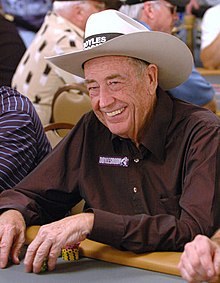There are multiple reasons people choose to retire. For some, it’s a personal decision that comes when they have enough financial stability to support them through the rest of their time on earth. For others, it’s a case of retiring from an industry where they’ve become a veteran, with an underlying need to explore work aspirations or hobbies elsewhere.
When it comes to the world of poker, there are plenty of typhoons who have chosen to retire from the tables early due to these very reasons. But, for the majority of professional poker players, retirement is something they choose to do at a much younger age than your typical working class Joe.

Reasons for Cutting the Cord
 While most of us can’t even fathom the prospect of settling down until around 65 — some of these guys are hanging up the gloves from as young as 27. Contrary to popular belief, however, it’s not always because they’ve won a colossal sum of cash to see them through their remaining years. Often, it can be down to much more unforeseeable circumstances, such as the ones below:
While most of us can’t even fathom the prospect of settling down until around 65 — some of these guys are hanging up the gloves from as young as 27. Contrary to popular belief, however, it’s not always because they’ve won a colossal sum of cash to see them through their remaining years. Often, it can be down to much more unforeseeable circumstances, such as the ones below:
Bankruptcy – It shouldn’t come as much surprise that professional poker players retire every year. This is because they simply cannot afford the expensive buy-ins or the lavish lifestyle that poker has provided them any longer. This could also be due to making consistently poor decisions in their last few tournaments, or because they have chased their losses for far too long.
Family Affairs – A lot of poker players are married with children, so throwing in the towel to take on a steady and more secure lifestyle is a perfectly valid reason why many retire. Of course, they can still partake in online poker tournaments, but the main events are taking place all over the world. It’s easy to see how the travelling and long periods away from home — coupled with the constant uncertainty over whether they’ll be returning with any winnings — could take its toll on anyone eventually.
 Addiction – Ben Affleck and Tobey Maguire are two celebrities who love to gamble, but both of them have suffered from borderline addictions in the past. Professional poker players are just as susceptible as anyone else in developing a problem, and this is something that typically leads to bankruptcy and financial trouble. An addictive personality in the gambling world spells chaos, so many in a full-time poker career have had to cut ties in order to make a fresh start.
Addiction – Ben Affleck and Tobey Maguire are two celebrities who love to gamble, but both of them have suffered from borderline addictions in the past. Professional poker players are just as susceptible as anyone else in developing a problem, and this is something that typically leads to bankruptcy and financial trouble. An addictive personality in the gambling world spells chaos, so many in a full-time poker career have had to cut ties in order to make a fresh start.
These are just a few reasons why many pros are almost forced into retirement as it were, but for most it’s more than likely down to the fact that they’ve simply grown bored of the activity due to exploring it too young, or because they just simply fancy a change!
What’s Life Like Once They’ve Retired?
 You might envision these poker stars relaxing on their private yachts out somewhere in the Mediterranean after they’ve retired. For some of them that will typically be the case; however, most tend to return after some time. When you’ve spent years of your life crafting your love of poker into a career, it doesn’t leave you with much of an ethic for a 9-to-5 job if you’re looking to come back to work later.
You might envision these poker stars relaxing on their private yachts out somewhere in the Mediterranean after they’ve retired. For some of them that will typically be the case; however, most tend to return after some time. When you’ve spent years of your life crafting your love of poker into a career, it doesn’t leave you with much of an ethic for a 9-to-5 job if you’re looking to come back to work later.
This means that a lot of renowned retired poker players have ventured into different waters after quitting. Some have gone on to open their own businesses, while others have set up charities and decided to help those in need. One or two have even found themselves in a completely new position of power altogether.
From Poker to Politics
Lithuanain poker player Antanas Guoga, aka Tony G, is one of these people who chose a different path after retirement. In 2014, he decided to seek out a life in politics and become a member of the EU parliament. Five years prior to this, he had set up his own European poker site called TonyBet.Com in collaboration with a gambling operator in Sweden. He has since been heavily involved in the blockchain and cryptocurrency markets, and developing health and fitness apps.
Brunson’s Change of Heart
 10-time WSOP bracelet winner Doyle Brunson made the decision to retire after growing concerns over his wife’s health conditions in 2018. When prompted for further comments by the media, however, he later confirmed he would only partially quit and still be playing the high stakes events in Vegas, but would no longer be buying into other tournaments.
10-time WSOP bracelet winner Doyle Brunson made the decision to retire after growing concerns over his wife’s health conditions in 2018. When prompted for further comments by the media, however, he later confirmed he would only partially quit and still be playing the high stakes events in Vegas, but would no longer be buying into other tournaments.
In the 50 years of his profession, he is considered one of the most successful poker players; earning over $3 million from 37 WSOP cashes, and over $6 million from live poker tournaments.
The Philanthropic Philosopher
Haseeb Qureshi is what most could only deem as a saint, after he decided to put his love for professional poker to bed in 2013. He took only $10,000 of his tournament winnings with him to start a new life, and donated the rest to several charities. During this time, he traveled the world, learned about new cultures, languages, and world ideologies before returning to university and publishing his very own book titled “How to Be a Poker Player: The Philosophy of Poker”. His work talks about the logistical mindset and approach needed to be successful in the game, along with teachings and professional strategy advice.
Retirement Doesn’t Work Out for Everyone…
As you can tell from the stars above, the majority of players who opt out of the poker world never tend to do so in all aspects. Unless they’ve grown bored or had a bad time with gambling in general, it’s an activity that has been ingrained in their lives for too long for them to give it up entirely.
Whether they continue playing online, with friends, or the odd tournament here and there, each one knows that there are no boundaries to the success you can have as a professional poker player. But it’s not the most orthodox or most stable career path — even for the industry’s best.
Disclaimer: All images are copyright of their respective owners and are used by USA Online Casino for informational purposes only.










